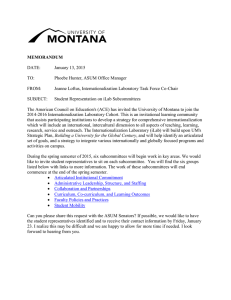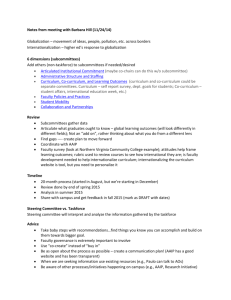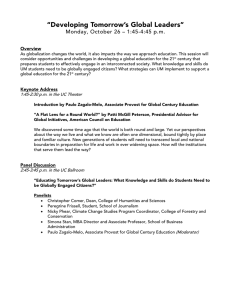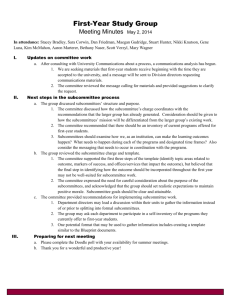iLab Meeting December 9, 2014 Present:
advertisement
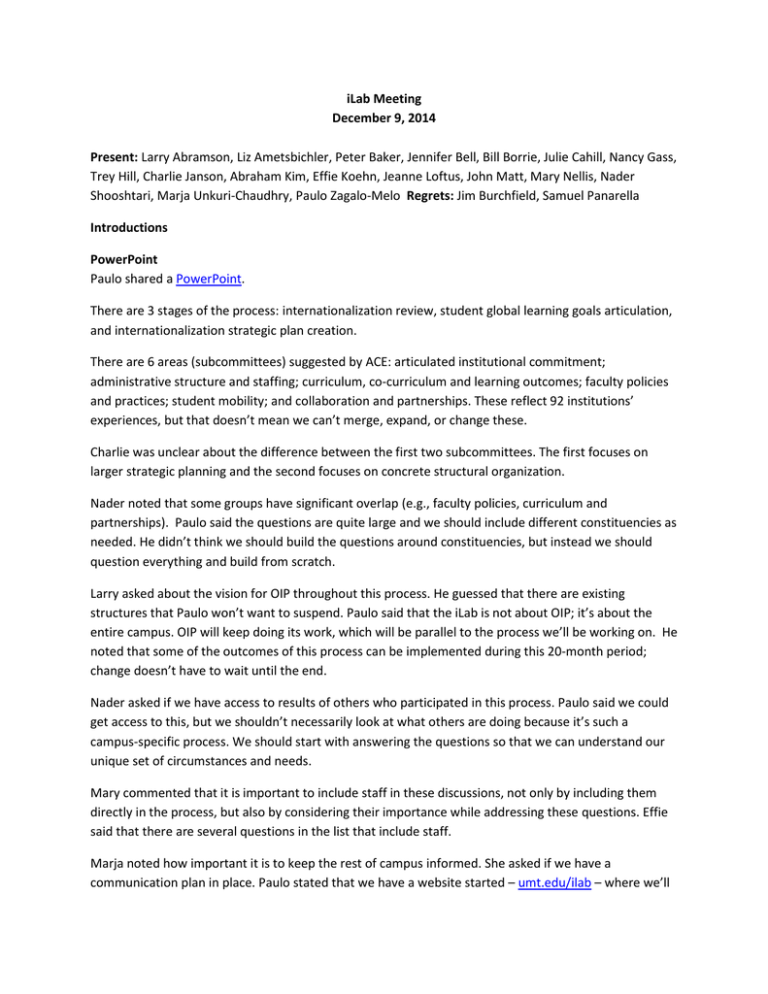
iLab Meeting December 9, 2014 Present: Larry Abramson, Liz Ametsbichler, Peter Baker, Jennifer Bell, Bill Borrie, Julie Cahill, Nancy Gass, Trey Hill, Charlie Janson, Abraham Kim, Effie Koehn, Jeanne Loftus, John Matt, Mary Nellis, Nader Shooshtari, Marja Unkuri-Chaudhry, Paulo Zagalo-Melo Regrets: Jim Burchfield, Samuel Panarella Introductions PowerPoint Paulo shared a PowerPoint. There are 3 stages of the process: internationalization review, student global learning goals articulation, and internationalization strategic plan creation. There are 6 areas (subcommittees) suggested by ACE: articulated institutional commitment; administrative structure and staffing; curriculum, co-curriculum and learning outcomes; faculty policies and practices; student mobility; and collaboration and partnerships. These reflect 92 institutions’ experiences, but that doesn’t mean we can’t merge, expand, or change these. Charlie was unclear about the difference between the first two subcommittees. The first focuses on larger strategic planning and the second focuses on concrete structural organization. Nader noted that some groups have significant overlap (e.g., faculty policies, curriculum and partnerships). Paulo said the questions are quite large and we should include different constituencies as needed. He didn’t think we should build the questions around constituencies, but instead we should question everything and build from scratch. Larry asked about the vision for OIP throughout this process. He guessed that there are existing structures that Paulo won’t want to suspend. Paulo said that the iLab is not about OIP; it’s about the entire campus. OIP will keep doing its work, which will be parallel to the process we’ll be working on. He noted that some of the outcomes of this process can be implemented during this 20-month period; change doesn’t have to wait until the end. Nader asked if we have access to results of others who participated in this process. Paulo said we could get access to this, but we shouldn’t necessarily look at what others are doing because it’s such a campus-specific process. We should start with answering the questions so that we can understand our unique set of circumstances and needs. Mary commented that it is important to include staff in these discussions, not only by including them directly in the process, but also by considering their importance while addressing these questions. Effie said that there are several questions in the list that include staff. Marja noted how important it is to keep the rest of campus informed. She asked if we have a communication plan in place. Paulo stated that we have a website started – umt.edu/ilab – where we’ll post members, minutes, resources, etc. Effie commented that Paulo has already met with Student Affairs folks. Paulo noted that he, Larry, and Jim are all AOs so they will keep those lines of communication open. All the colleges are represented on the taskforce and steering committee. It’s up to the members to help report back to their colleagues and units. Each member needs to define what their level of communication is with their college. Larry felt that ongoing visibility is important. Tiles on the UM homepage, presentations at colleges throughout the process, University Council, Faculty Senate are all opportunities to communicate. Nancy stated that the Provost’s Office will send out a campus memo shortly. Where does this fit in with the diversity effort on campus? Paulo said that there has been trend in higher ed to merge internationalization and diversity. Perhaps this is a question we need to address in this process. Marja asked if there are certain guidelines for the subcommittees. Paulo suggested that we’ll have guidelines for reporting timelines, but doesn’t think we should create a set of rules for all the subcommittees since they will all be working on different issues. Trey asked if the subcommittees will be using the “Questions Guide” to help direct their work. Nader asked if all subcommittees will answer all questions. Paulo said the questions will guide the subcommittees and different groups will focus on different questions. Nader clarified that we are answering these questions on behalf of the entire campus. Paulo noted that before collecting data (surveys, interviews, etc.) we should see what other committees are doing (AAIP) so we don’t duplicate efforts. He will be meeting with Andrew Ware to discuss AAIP. Nader suggested that we need agreement on methodology for data collection. Larry suggested creating a research and outreach subcommittee that could be tasked with collecting information. This team could coordinate the efforts. Paulo suggested that the steering committee could do perform that role, but we can talk about that again once we look at what data we need and the suggestions from the subcommittees as to how it should be collected. Peter suggested that everyone review the 6-page inventory of internationalization resources that was widely disseminated around campus a couple years ago. Effie clarified that the steering committee will complete the strategic plan. Review of “Questions to Guide the Internationalization Review” The document of questions was briefly discussed. These questions will help guide the work of the subcommittees and each subcommittee will focus on different questions. Timeline for iLab The iLab team will meet twice in the spring semester - once towards the beginning and once towards the end. The co-chairs of the taskforce and steering committee will conference call monthly with ACE. The chairs of each subcommittee will meet with co-chairs of the taskforce monthly. The subcommittees can determine how often they need to meet, but should probably meet in January in order to get started on their tasks. Data collection should be complete by April 15 so that some analysis can take place before May 15 (when faculty go off contract). All our work will be complete by June 2016. Within that time there will be 3 meetings in DC with ACE. Subcommittees The group agreed to organize using the 6 subcommittees suggested by ACE. ACE suggests that committees be chaired or co-chaired by faculty. The subcommittees will need to review the list of questions, determine what data they think is needed to answer those questions, and suggest what methodology should be used to collect data. These tasks should be completed by the time the whole taskforce meets next in February. Subcommittees can invite others as members or invite others to specific meetings as needed. Jeanne will circulate a survey asking people to indicate the subcommittees they wish to serve on, suggest others who can be invited to the subcommittees, and suggest resources that should be included on the website. UM Box Jeanne shared tools in UM Box that can be used throughout this collaborative process. She will invite the group to be contributors to these folders. Each subcommittee will have its own folder. She will also create a set of directions so users know how to use some of the basic features.
